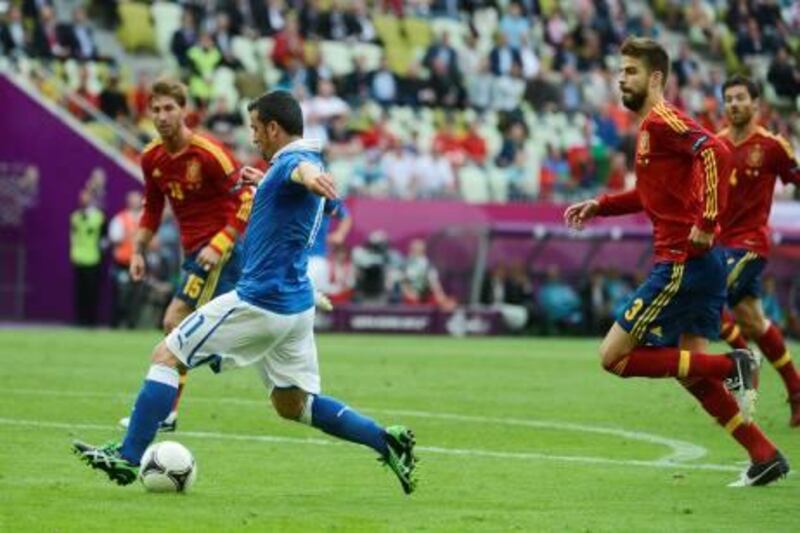GDANSK, POLAND // So complete has been Spain’s hegemony over football’s grand prizes we forget how fine the margins were in their triumphs. Euro 2008 first conquered after an edgy, penalties, defeat of Italy; the World Cup claimed upon a long sequence of single-goal victories two years later.
No argument that Spain possess better technicians than any nation here. Nor that their possession-pressing game and mental strength are fearsome weapons. Yet, as an unfancied, embattled Italian team demonstrated here, nothing can be guaranteed unstoppable.
As ever Spain finished the game with their customary advantage in ball control and attempts on goal. Italy, though, outwitted them tactically, led through a fine Antonio Di Natale strike that exposed shortcomings in the holders’ back four, and regularly stressed Iker Casillas.
As the Spaniards blamed the result on an unwatered, over-long Gdansk turf that slowed their passing game, the Italians celebrated a revival. “This is the real Italy,” said Cesare Prandelli. “We really tried to press the Spaniards from the start of their attacks. We tried to avoid one-on-ones and for 60-70 minutes I think we played very well at the back.”
In Madrid the match has been billed as “the best Spain in history against the worst Italy in history”. That the Spanish could be so confident about meeting a nation they had only bested twice in 10 major tournament encounters and succumbed to last November was a reflection of Italy’s recent travails.
Prandelli had lost all three of his warm-up games, lost preferred striker Guiseppe Rossi to a repeat knee injury, lost his first-choice left-back to a match-fixing investigation that threatens others within his squad, and given up on the tactics that saw Italy through qualifying unbeaten.
If his switch to a three-man defence seemed an expedient attempt to adopt the Serie A winning methods of Juventus (two of the club’s starting centre backs and the goalkeeper borrowed too), there was more subtle thinking involved. Prandelli employed Daniele De Rossi as the third central defender to provide quick, accurate passing. His midfield trio of Andrea Pirlo, Thiago Motta and Claudio Marchiso were instructed to rotate positions to confound Spanish pressing.
Vincente Del Bosque responded with his own unexpected variation. The debate over which of the striking Fernandos should play was resolved by leaving both Torres and Llorente on the bench. Instead Spain’s coach started Cesc Fabregas between Andres Iniesta and David Silva.
“We were laughing at the teamsheet as we couldn’t find a striker,” said De Rossi. Aware enough to adapt their defending to it, his team were the beneficiaries.
When Spain had the ball Prandelli’s wingbacks retreated to form a five. The centre of the pitch was further congested by his midfielders and a striker. Though the champions still created chances, Italy’s were superior.
Antonio Cassano escaped markers on either side of the area to make Casillas scurry or save inelegantly. The striker, as unpredictable in behaviour as partner Mario Balotelli, teed up Italy's twin incursori Marchisio and Motta for two well-saved efforts.
Eventually even Casillas could not deny them. Pirlo, as impressive as he has been all season, bested Sergio Busquets in midfield before sending Di Natale up against Gerard Pique. As the substitute won that foot race, Sergio Ramos stepped up to play offside, ending any chance of a covering tackle. Di Natale’s finish was as smart as his run.
Spain rescued a point with characteristic elegance. Xavi, Iniesta and Silva worked a one-touch triangle on the apex of the area before the last of them angled Fabregas in off the shoulder of debutant wing-back Emanuele Giaccherini. Del Bosque’s immediate switch to the plan B of touchline hugging winger Jesus Navas and a still out of touch Torres was an admission that tactically he had been outsmarted.
“Si! Si! Si! La copa ya esta aqui!” (Yes! Yes! Yes! The cup is now here) chanted a Spanish support grown complacent on serial success. While that cup is still with Spain, we have seen how it could be taken from them.
sports@thenational.ae
Follow us
[ @SprtNationalUAE ]





